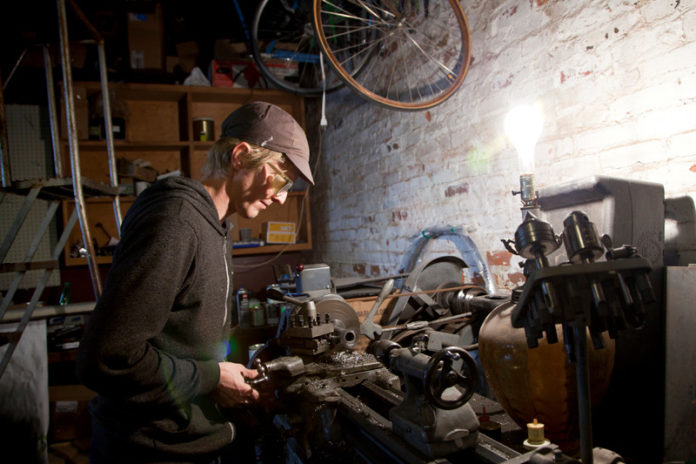
The custom bicycle frames being built by hand at Circle A Cycles in Providence combine the old and the new.
Old in that the idea of manufacturing bicycles to order using traditional techniques like torch welding dates back to at least the first half of the 20th century. New because the road, mountain and single-speed frames coming out of the Charles Street shop feature light, modern steel and an aesthetic that often departs from the two-wheelers of the 1930s.
And because until recently, when a resurgence in custom-bicycle building began gaining momentum across the country, finding someone manufacturing bicycles professionally this way was nearly impossible in most cities.
“The concept of bespoke bicycles is not new, but there are a lot more now than there were 20 or 30 years ago,” said Brian Chapman, a builder at Circle A who has also started his own line of custom frames called Chapman Cycles. “When I first moved here I didn’t know there were any custom-frame makers around. There are now legit businesses almost everywhere.”
Although unlikely to put much of a dent in Rhode Island’s unemployment rate, custom-bicycle making is become another strong point in the state’s design-centered boutique manufacturing sector.
There are at least four commercial bicycle-frame makers in Providence and close to a dozen across New England. There are also at least two paint shops that specialize in bike finishing and a local apparel maker that has designed hooded rain capes for cycling.
At the New England Bike Builders Ball this fall at the Providence Biltmore, there were 13 exhibitors displaying frames and other goods, along with 400 attendees.
In many ways, the popularity of custom bicycle frames mirrors the evolution of other high-end, niche products from craft beer to clothes and home furnishings.
But one aspect of custom-bicycle building that distinguishes it from other high-end goods is the degree to which, even more than clothes, it is tailored to each customer.
The whole point of custom bicycles is that, while conventional frames boast carbon fiber and other exotic materials, hand-made bicycles promise a product tailored to each user, like the best English or Italian suit.
“The biggest difference is being fit for the bicycle,” Chapman said. “When someone comes in we take measurements, like inseam, and plug those into a computer to build the best frame.”
Unlike, say, craft beers, which can tempt even the most dedicated American lager customer from the display case, most bike buyers likely never know custom frames exist.
For many custom builders, who can only make so many frames, a low profile is not a bad thing. The industry exudes a buy-local, somewhat anti-corporate sentiment.
Although it is difficult to pin down a single factor that spurred the growth of custom-bicycle building, many point to dissatisfaction with mass-produced bikes among people with the metal-work skills to make their own.
As custom-bike makers are eager to point out, while their frames cost more than the average mass-produced bicycle, they cost far less than high-performance, conventional bicycles made of carbon fiber and other exotic materials.
Custom-frame bikes generally range in price from around $1,500 to $3,000, while high-performance racing bicycles from a factory can cost from $5,000 to $8,000.
Once custom frames started appearing within the cycling community, more enthusiasts learned the trade and started building.
Chapman was a bicycle enthusiast working in information technology at Brown University when he met Circle A founder Chris Bull in 2004 and started learning the frame-building process. Bull himself had learned how to build bicycles from the founder of Hot Tubes, a frame-making shop in Worcester, Mass. A third builder, Jay Nutini, has also joined Circle A, which turns out one or two new frames each week.
In Warwick, Ocean State Hot Coat, a powder-coating commercial painter, has become a favorite among local frame-builders for applying the finishing touches to new custom bicycles.
Local repair shops also work with custom-frame builders when a bicycle is damaged so seriously it needs major structural repairs to get it back on the road.
“All the jobs I have had before have been in smaller towns at places where they’re the only ones around doing this,” said David Harrison, owner of Pedal Driven Cycles. “It is nice to be in Providence, where there are so many others and you’re close to Boston where there are a ton of frame builders. ”
A Mississippi native who worked building frames in upstate New York and Connecticut before coming to Rhode Island, Harrison welcomes having other builders around for the sense of community and the awareness it brings to local, custom-frame making.
“Some people may look at it as competition, but we look at it as friends helping each other,” said Harrison, whose background is in BMX but who intends to spread out into other styles. “I feel like so many people are still clueless that bikes are even manufactured in the United States. And we are all so different from each other and have our own niches.”
Chapman’s new side project, Chapman Cycles, focuses on retro-style touring and commuter bicycles with a more classic look and “more boundaries” than many of the creations he works on at Circle A.
One benefit and occupational hazard of building bicycles for a living, Chapman said, is that no matter how much you love what you are riding now, you are always thinking about what you could ride next.
“I built myself one last year, and I love it, but I am already thinking about my next bike,” Chapman said. •










